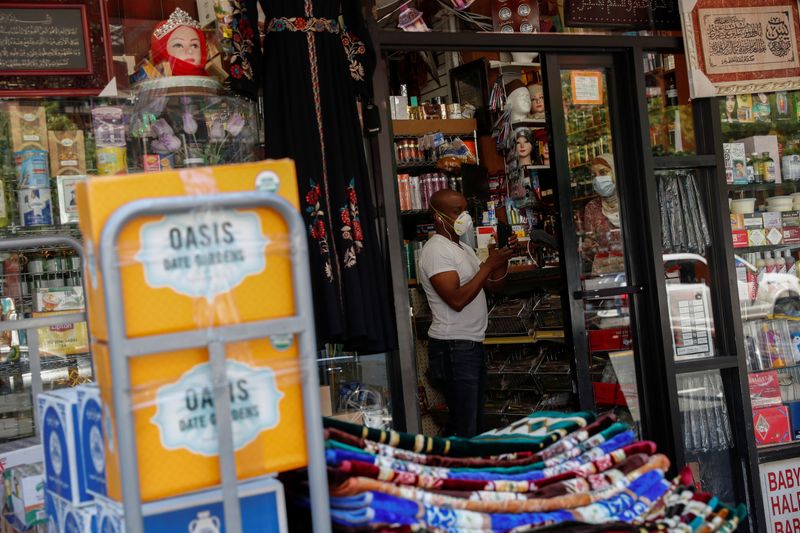By Lucia Mutikani
WASHINGTON (Reuters) - U.S. consumer sentiment perked up in early June as households cheered the reopening of businesses and a surprise rebound in hiring, though they did not expect a significant improvement in the economy amid fears of a resurgence in COVID-19 infections.
The survey from the University of Michigan on Friday is broadly in line with economists' expectations that the recovery from the recession would be a long slog. The National Bureau of Economic Research, the arbiter of U.S. recessions, declared on Monday that the economy slipped into recession in February.
"While uncertainty about the future is beginning to ease, it is still higher than it was at anytime during the Great Recession," said Joel Naroff, chief economist at Naroff Economics in Holland, Pennsylvania. "That raises questions about the willingness to purchase big-ticket items. If we don't see that happen, the recovery will be slower than hoped for."
The University of Michigan's consumer sentiment index increased to a reading of 78.9 from 72.3 in May. It said "few consumers anticipate the reestablishment of favorable economic conditions anytime soon." Two-thirds of consumers in the survey expected "bad times financially" during the year ahead, while half anticipated a "renewed downturn."
In addition to concerns about a second wave of COVID-19 infections, consumers also worried that persistently high unemployment could slow the economic recovery. Though the economy created 2.5 million jobs in May, an employment gap of nearly 20 million remains since March when nonessential businesses were shuttered to slow the spread of COVID-19.
Layoffs are more than double their peak during the 2007-09 Great Recession.
Economists polled by Reuters had forecast the sentiment index would rise to 75 early this month.
While the University of Michigan survey showed consumers' inflation expectations easing slightly in June, they remained above their pre-COVID-19 shutdown levels. Consumers' one-year inflation expectations slipped to 3.0% from 3.2% in May. Five-year inflation expectations dipped to 2.6% this month from 2.7%.
Consumers' inflation perceptions in the past months have been driven by higher food prices, amid meat shortages caused by COVID-19 outbreaks at processing plants.
"That provides some reassurance that the recent plunge in prices for travel-sensitive services like airline fares and motor vehicle insurance will not lead to a more widespread period of falling prices," said Andrew Hunter, a senior U.S. economist at Capital Economics.
Stocks on Wall Street were trading higher, recouping about half of the previous session's sharp losses. The dollar rose against a basket of currencies. U.S. Treasury prices fell.
IMPORT PRICES RISE
Deflation fears were further assuaged by a separate report from the Labor Department on Friday showing import prices rose 1.0% in May, the largest gain since February 2019, after falling 2.6% in April. Import prices, which exclude tariffs, were driven by higher costs for petroleum products and food.
The government reported this week consumer prices falling moderately in May and a solid rebound in producer prices. Deflation is a decline in the general price level, which is harmful during a recession as consumers and businesses may delay purchases in anticipation of lower prices.
"These gains should support June increases for CPI and PPI," said Mike Englund, chief economist at Action Economics in Boulder, Colorado. "Trade prices should rise further in June with oil prices, alongside a lift from a drop-back in the value of the dollar, though we have an ongoing headwind from demand destruction with global shutdowns."
The Federal Reserve, which tracks the core personal consumption expenditures price index for its 2% inflation target, sharply lowered its inflation projections on Wednesday. The U.S. central bank projected core inflation rising 1.0% this year and picking up to 1.5% in 2021. Back in December, it forecast inflation at 1.9% this year and 2% in 2021.
In May, prices for imported fuels and lubricants surged 20.5% after declining 31.0% in the prior month. Petroleum prices jumped 21.7% after plunging 32.6% in April. Imported food prices rebounded 2.2% last month after dropping 1.6% in April.
Excluding fuels, import prices gained 0.1% following a 0.5% drop in April. The cost of goods imported from China was unchanged in May. Prices declined 1.0% year-on-year, the smallest drop since March 2019.
The government also reported that export prices rose 0.5% in May as higher prices for nonagricultural products offset lower prices for agricultural goods. That followed a 3.3% drop in April. Export prices fell 6.0% on a year-on-year.
Prices for agricultural exports declined 0.5%, pulled down by weaker prices for corn, dairy products and soybeans. That more than offset higher prices for meat, vegetables and cotton. Agricultural export prices fell 3.5% year-on-year.

Nonagricultural export prices rose 0.6%, boosted by higher prices for industrial supplies and materials, which overcame decreases in prices for capital goods, consumer goods, automotive vehicles, and nonagricultural foods.
